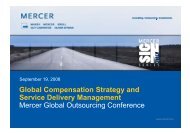A SERIES OF ARTICLES FRoM THE 2011 EMEA CoMPENSATIoN ...
A SERIES OF ARTICLES FRoM THE 2011 EMEA CoMPENSATIoN ...
A SERIES OF ARTICLES FRoM THE 2011 EMEA CoMPENSATIoN ...
Create successful ePaper yourself
Turn your PDF publications into a flip-book with our unique Google optimized e-Paper software.
GLOBAL COMPENSATION AND BENEFITS:<br />
WHAT’S WORKING<br />
A year ago, few business leaders and economists envisioned a<br />
<strong>2011</strong> with debt downgrades and a stumble in the global economic<br />
recovery. While many occurrences are nearly impossible to predict,<br />
Mercer’s global compensation and benefits experts anticipate<br />
– with cautious optimism – areas of growth and a slow return to<br />
pay increases, but they also warn about short-term setbacks and<br />
highlight workforce demographic and employee engagement<br />
challenges across geographies and workforce generations.<br />
Since the recession, all compensation and benefits<br />
professionals have needed to place even more<br />
emphasis on what is happening in the economy.<br />
In mid-<strong>2011</strong>, when organisations thought the global<br />
recession was in the past, several markets entered<br />
what many are calling a temporary soft patch, and<br />
even companies in relatively stable economies started<br />
to face new concerns related to inflation and talent<br />
retention. And in late <strong>2011</strong>, developments in Europe<br />
added to the pressure.<br />
With income inequality increasing in many countries,<br />
a debt crisis and austerity plans in Europe, and additional<br />
cost pressures coming from all angles just as the<br />
war for talent reaches a critical juncture, the climate<br />
for making compensation decisions is rather difficult.<br />
All this comes at a time when employees worldwide<br />
are saying that they are motivated most by base pay<br />
and career advancement – and unfortunately, many<br />
say they are dissatisfied with what their companies<br />
offer. This presents a challenge in 2012, as conservative<br />
salary increases are expected in most regions,<br />
averaging about 2.7%–2.8% in Western Europe and<br />
the United States.<br />
Furthermore, to make matters worse, the reality is<br />
that organisations today do not operate in stable<br />
labour markets, as Europe’s workforce in particular is<br />
shrinking and the worldwide workforce is changing<br />
in composition, education and age. Governments<br />
have been increasing retirement ages in response to<br />
the ageing of their populations, but organisations are<br />
struggling to deal with the current and future implications<br />
of ageing workforces in their people strategies.<br />
Organisations should prepare to invest in training<br />
their older workforce segments in the right skills if<br />
they want to keep productivity levels up. Having four<br />
generations at work is obviously challenging, but<br />
creating synergies between generations – the baby<br />
boomers seem to resonate well with Gen Y, and Gen<br />
X with Gen Z – can result in a stronger culture and<br />
increased performance. A sustainable workforce is<br />
key to competitive advantage, and more and more<br />
organisations worldwide are embarking on strategic<br />
workforce planning as part of their business planning.<br />
AUSTERE TIMES AND CONSERVATIVE SALARY<br />
INCREASES IN EUROPE<br />
Employees in some European countries will<br />
experience another year of below-inflation pay rises<br />
in 2012, according to Mercer’s October <strong>2011</strong> Total<br />
Remuneration Survey snapshot survey data for Europe,<br />
the Middle East and Africa (<strong>EMEA</strong>). 1 Companies across<br />
Western Europe are predicting that their employees<br />
will be given pay rises averaging 2.7% in 2012. This<br />
represents the lowest increase across the entire <strong>EMEA</strong><br />
region.<br />
10<br />
1<br />
Mercer’s Total Remuneration Survey Quarterly Pulse Survey analyses the pay plans of 329 multinational organisations operating across 69<br />
countries in <strong>EMEA</strong>. The survey provides information from multinationals on median base pay increases across all employee groups,<br />
including blue-collar and white-collar workers up to the management level.
















